January 20, 2015. Yep, that’s right. Let’s call a spade a spade. I’m illiterate. I’m living in a place where I can’t read a newspaper, the street signs, ads in store windows, cryptic notes that my neighbors post in the hall, or the operating instructions for my washing machine. I can’t fill out forms or applications at the bank, post office, or dentist’s office without someone translating each line to me in English. Most of my mail is from various government organizations theoretically welcoming me to Norway as a new resident. But since these letters are always in Norwegian, they somehow feel less welcoming and more just downright intimidating — especially when they come from the Politiet (the police, who handle lots of immigration issues here.)
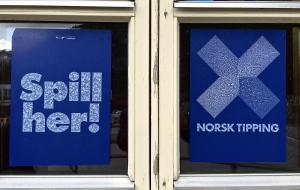
Google Translate is my favorite app, but it’s best only when you’re translating single words or short lines. Sadly, it takes longer to input the instructions on a box of quick-cooking risotto than it takes to actually make the risotto. And trying to type in and keep up with notifications of bus or train schedule changes as they roll across the signboard is virtually impossible. My fingers just can’t find and peck out those three pesky extra Norwegian letters (æ, ø and å) fast enough.
Even understanding what constitutes a word can be tricky. Like German, Norwegian often strings together many words into a single compound word. For example, looking up a veterinarian required finding a dyresykehuset (animal + sick + house = animal hospital). Sitting in the vet’s office, I found my favorite Norwegian word puzzle so far: skjoldbruskkjertelenhelse. It means “thyroid health” (shield + cartilage + gland + health). Deciphering where one word ended and the next began kept both me and Google entertained for a good ten minutes. Since then, I’ve found several more Norwegian words that could easily compete with antidisestablishmentarianism (officially the longest word in the English language — unless you count Hippopotomonstrosesquippedaliophobic, which is the technical term for “those who have a fear of long words.”)
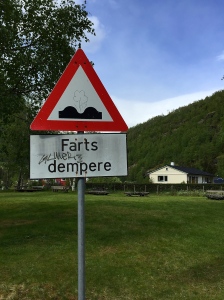
I thought for certain that my five years of German might come in handy here. Sure, ja means yes, and nei (like nein) means no. But that’s pretty much where the similarity ends. Of course, some words such as “folk” and “egg” are recognizable because they come from the Viking language stock that we’ve all inherited. Other words look surprisingly familiar but have totally different meanings — leading to amusing misinterpretations as represented by the collection of photographs I’ve assembled here. (Pardon my adolescent humor.)

Part of the problem is the pronunciation. For example, listening for a particular stop on the bus or train can be confusing. Kjelsås is pronounced “Shell-sohs,” not “Kah-yell-sass” as we might say in English. I can’t tell you how many times I’ve missed my stop because I can’t see the monitor and I’m listening for an entirely different pronunciation of my destination.
Since our work schedule hasn’t allowed for Matthew and me to take language lessons yet, our primary education on Norwegian phonetics has been these transportation announcements. The T-bane’s female recording has particularly nice diction. Matthew and I often amuse ourselves on rides by repeating over and over her pronunciations of the various place names, attempting to vanquish our American accents, until folks begin to scoot away from us as if we might be mentally deficient.
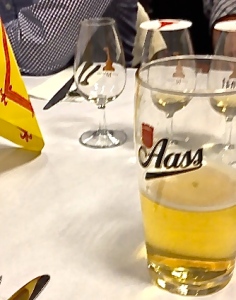
But then again, pronunciation is entirely dependent upon which county or province you’re in. As I mentioned in an earlier post, Norway has 19 counties with 19 different dialects. Not accents, dialects. That means not only do the words sound different, but the grammar changes, as do the actual meanings of many of the words. For example, to say “little” in Oslo, you’d use the word lille, but in Flåm, you’d use the word vetla. Even more fun, in Trøndelag, folks sometimes pronounce only the vowels and not the consonants. Ain’t language grand?
An abundance of dialects means that every single time I try to use a Norwegian word, I’ll get corrected with an entirely different pronunciation. I once had a five-minute conversation with a store clerk that consisted of us volleying the word “bryggen” (BREE-gen, meaning “the pier”) back and forth until he thought I said it correctly. Big surprise, he was never quite satisfied, and the conversation continued in English.
I think part of it may be that there are only 5 million Norwegian speakers in the entire world, and most of them reside only in Norway. (For comparison, consider that there are 400 million English-as-a-first-language speakers around the globe.) Maybe Norwegians just aren’t used to hearing non-Norwegians speak their language with a foreign accent (although that’s changing as immigration increases particularly in big cities like Oslo).
But sometimes, I’m convinced that Norwegians do understand me, they’re just being a bit too perfectionistic. I can’t tell you how many times I’ve wanted tell them that I’d learn Norwegian a lot faster if we could engage in an actual conversation, rather than a language lesson. It’s funny, because I often hear Norwegians mourn that their language is dying out because so few people speak it. I have to resist the urge to point out that if they were a bit more tolerant in accepting new learners’ mistakes, more people might take on the challenge. Just a thought….
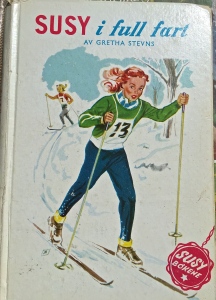
Every now and then, when I’m being unrelentingly chastised by Norwegians for my accent, I’m tempted to correct them on their pronunciation of English words, just to let them know that they speak with an accent, too. But I’ve been told that it’s better just to say, “I’m sorry, I’m not as smart as you,” which is basically telling a Norwegian that he’s violated the sacred Jante’s Law by being an arrogant prig.
Often jokingly referred to as the Scandinavian Ten Commandments, Jante’s Law lays out ten principles of humility that a good Norwegian should strive for, including “you are not to think that you are smarter than we are” and “you are not to think you know more than we do.” But at the risk of violating this law, here are a few fun facts that I think I’ve learned about Norwegian so far, although I’m probably wrong.
- Although Norwegian is a Germanic language, the letter “r” is not hocked from the back of the throat like nasal drainage. It’s rolled softly, as in Spanish.
- “En” at the end of the word means “the” (i.e. Hobbiten = The Hobbit.) But if you want to make something plural, it seems that all you have to do is slap an “er” on its backside (i.e. Hobbiter = Hobbits.)
- There appear to be an inordinate number of letters and combinations of letters that represent the sound “sh” — s, sj, rs, skj, kj, and ki — this last one sometimes leading to the mispronunciation of my name as “Shimberly.”
- A bit like French, Norwegian drops the last consonant of a word ending in “d,” “t,” or “v.” For example, God Jul (meaning essentially “Merry Christmas”) sounds like “Goo Yool.” However, vowels like “e” at the end of a word are always pronounced, so that words like ikke and T-bane sound like “EEK-keh” and “TAY-bah-NEH.”
- So about that “e.” The first syllable in a word is usually stressed. But if you encounter an “e” on the third syllable, it’s also often accented hard and lilted upwards, like Seinfeld’s “up-speak.” It’s this tendency, combined with a downbeat in the preceding syllable, that gives Norwegian the singsong, “follow-the-bouncing-ball” cadence similar to the accent of the Swedish chef on The Muppets.

My favorite thing about this ad is the way the product is pronounced in Norwegian. “I Phone Sex.” - Apparently Swedish, Norwegian, and Danish all use the same basic written language (called Bokmål or “book language” in Norwegian), but the pronunciation can be quite different. I think spoken Norwegian sounds almost like Gaelic, while Swedish sounds closer to Russian, and Danish sounds closer to German.
In closing my monologue, I’d like to address what Matthew and I fondly refer to as “The Norwegian Noises.” These odd sounds can be quite confusing as to their meaning, and they’re liberally sprinkled throughout any conversation with a Norwegian, so here’s a primer.
- Oy! is an exclamation, invoked a bit like the Yiddish “Oy Veh” to illustrate surprise or exasperation. An expressive Norwegian will squeak this out sharply and jump a little bit, as if they’ve been suddenly pricked by a needle.
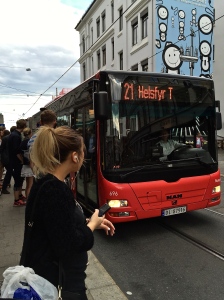
- Mmmm? This one is hard to describe, but it starts on a high note, drops to a low note, then ascends up the chromatic scale quickly. Basically, it sounds like the skeptical, sneering noise someone would make to express doubt about the truth of your words. It’s really just a form of agreement, like our “uh-huh,” but it sounds so mockingly snide that I unfortunately have a hard time not smacking a person when they do this to me.
- Ja! [inhaled, not exhaled]. Another difficult sound to describe, it also indicates agreement. It comes out sounding like a short, sharp gulp of air — what you’d do if someone told you shocking news. The first time I experienced it, my vet asked me to tell her the history of my cat’s eye condition. About two lines into my story, she gasped. I said, “What’s wrong?” She said, “Nothing, go on.” I continued, and a few seconds later, she gasped again. I said, “Is that bad; did I use the wrong medicine?” She looked at me funny and told me to continue my narrative. Her short, shocked gasps continued throughout my monologue, which confused the hell out of me until I finally figured out the sound meant the equivalent of “ah” or “okay.” Since then, I notice this noise all the time, and it kinda makes everyone sound as if they’ve suddenly swallowed a fly. Or as if asthma is a national malady.
And on that note, I’ll apologize for this incredibly lengthy blog and sign off with the typical Norwegian parting, Ha det bra, which means “Have it good” and has absolutely nothing whatsoever to do with lingerie.








Hilarious!! Sorry about your ice fall!! not fun! xo
LikeLike
Hi Kimberly, I am Angie Beck’s mom and look forward to reading of your’s and Matt’s adventures!
LikeLike
Hi Lorrie! Hope you enjoy them — I’ve enjoyed hearing about your African safari!
LikeLike